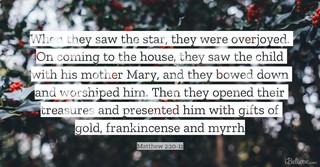- Recent Translations
- All Translations
Matthew 2
Share
Settings
Wise Men Visit Jesus
1 Now [after][a] Jesus was born in Bethlehem of Judea in the days of Herod the king, behold, wise men from the east came to Jerusalem,Joseph, Mary, and Jesus Escape to Egypt
13 Now [after] they had gone away, behold, an angel of the Lord appeared in a dream to Joseph, saying, "Get up, take the child and his mother and flee to Egypt, and stay there until I tell you. For Herod is about to seek the child to destroy him."Herod Has Innocent Children Murdered
16 Then Herod, [when he] saw that he had been deceived by the wise men, became very angry, and he sent [soldiers] [and] executed all the children in Bethlehem and in all the region [around] it from [the age of] two years old and under, according to the time which he had determined precisely from the wise men.Joseph, Mary, and Jesus Return to Nazareth
19 Now [after] Herod had died, behold, an angel of the Lord appeared in a dream to Joseph in Egypt,Matthew 2 Commentary
Chapter 2
The wise men's search after Christ. (1-8) The wise men worship Jesus. (9-12) Jesus carried into Egypt. (13-15) Herod causes the infants of Bethlehem to be massacred. (16-18) Death of Herod, Jesus brought to Nazareth. (19-23)
Verses 1-8 Those who live at the greatest distance from the means of grace often use most diligence, and learn to know the most of Christ and his salvation. But no curious arts, or mere human learning, can direct men unto him. We must learn of Christ by attending to the word of God, as a light that shineth in a dark place, and by seeking the teaching of the Holy Spirit. And those in whose hearts the day-star is risen, to give them any thing of the knowledge of Christ, make it their business to worship him. Though Herod was very old, and never had shown affection for his family, and was not himself likely to live till a new-born infant had grown up to manhood, he began to be troubled with the dread of a rival. He understood not the spiritual nature of the Messiah's kingdom. Let us beware of a dead faith. A man may be persuaded of many truths, and yet may hate them, because they interfere with his ambition, or sinful indulgences. Such a belief will make him uneasy, and the more resolved to oppose the truth and the cause of God; and he may be foolish enough to hope for success therein.
Verses 9-12 What joy these wise men felt upon this sight of the star, none know so well as those who, after a long and melancholy night of temptation and desertion, under the power of a spirit of bondage, at length receive the Spirit of adoption, witnessing with their spirits that they are the children of God. We may well think what a disappointment it was to them, when they found a cottage was his palace, and his own poor mother the only attendant he had. However, these wise men did not think themselves baffled; but having found the King they sought, they presented their gifts to him. The humble inquirer after Christ will not be stumbled at finding him and his disciples in obscure cottages, after having in vain sought them in palaces and populous cities. Is a soul busy, seeking after Christ? Would it worship him, and does it say, Alas! I am a foolish and poor creature, and have nothing to offer? Nothing! Hast thou not a heart, though unworthy of him, dark, hard, and foul? Give it to him as it is, and be willing that he use and dispose of it as it pleases him; he will take it, and will make it better, and thou shalt never repent having given it to him. He shall frame it to his own likeness, and will give thee himself, and be thine for ever. The gifts the wise men presented were gold, frankincense, and myrrh. Providence sent these as a seasonable relief to Joseph and Mary in their present poor condition. Thus our heavenly Father, who knows what his children need, uses some as stewards to supply the wants of others, and can provide for them, even from the ends of the earth.
Verses 13-15 Egypt had been a house of bondage to Israel, and particularly cruel to the infants of Israel; yet it is to be a place of refuge to the holy Child Jesus. God, when he pleases, can make the worst of places serve the best of purposes. This was a trial of the faith of Joseph and Mary. But their faith, being tried, was found firm. If we and our infants are at any time in trouble, let us remember the straits in which Christ was when an infant. ( 16-18 ) Herod killed all the male children, not only in Bethlehem, but in all the villages of that city. Unbridled wrath, armed with an unlawful power, often carries men to absurd cruelties. It was no unrighteous thing with God to permit this; every life is forfeited to his justice as soon as it begins. The diseases and deaths of little children are proofs of original sin. But the murder of these infants was their martyrdom. How early did persecution against Christ and his kingdom begin! Herod now thought that he had baffled the Old Testament prophecies, and the efforts of the wise men in finding Christ; but whatever crafty, cruel devices are in men's hearts, the counsel of the Lord shall stand.
Verses 19-23 Egypt may serve to sojourn in, or take shelter in, for awhile, but not to abide in. Christ was sent to the lost sheep of the house of Israel, to them he must return. Did we but look upon the world as our Egypt, the place of our bondage and banishment, and heaven only as our Canaan, our home, our rest, we should as readily arise and depart thither, when we are called for, as Joseph did out of Egypt. The family must settle in Galilee. Nazareth was a place held in bad esteem, and Christ was crucified with this accusation, Jesus the Nazarene. Wherever Providence allots the bounds of our habitation, we must expect to share the reproach of Christ; yet we may glory in being called by his name, sure that if we suffer with him, we shall also be glorified with him.
Matthew 2 Commentaries
Footnotes 28
- [a] *Here "[after]" is supplied as a component of the temporal genitive absolute participle ("was born")
- [b] Or, "when it rose"; traditionally rendered "in the east" by many English versions
- [c] *Here "[when]" is supplied as a component of the participle ("heard") which is understood as temporal
- [d] *Here the direct object is supplied from context in the English translation
- [e] *Here "[after]" is supplied as a component of the participle ("calling together") which is understood as temporal
- [f] A quotation from Mic 5:2
- [g] *Here "[and]" is supplied because the previous participle ("summoned") has been translated as a finite verb
- [h] *Here "[when]" is supplied as a component of the temporal genitive absolute participle ("appeared")
- [i] *Here "[and]" is supplied because the previous participle ("sent") has been translated as a finite verb
- [j] *Here "[and]" is supplied because the previous participle ("may come") has been translated as a finite verb
- [k] *Here "[after]" is supplied as a component of the participle ("listened to") which is understood as temporal
- [l] Or, "when it rose"; traditionally rendered "in the east" by many English versions
- [m] *Here "[and]" is supplied because the previous participle ("came") has been translated as a finite verb
- [n] *Here "[when]" is supplied as a component of the participle ("saw") which is understood as temporal
- [o] *Here "[when]" is supplied as a component of the participle ("came") which is understood as temporal
- [p] *Here "[and]" is supplied because the previous participle ("fell down") has been translated as a finite verb
- [q] *Here "[and]" is supplied because the previous participle ("got up") has been translated as a finite verb
- [r] *Here "[when]" is supplied as a component of the participle ("saw") which is understood as temporal
- [s] *Here the direct object is supplied from context in the English translation
- [t] *Here "[and]" is supplied because the previous participle ("sent") has been translated as a finite verb
- [u] Literally "they are not"
- [v] A quotation from Jer 31:15
- [w] *Here "[after]" is supplied as a component of the temporal genitive absolute participle ("had died")
- [x] *Here "[and]" is supplied because the previous participle ("got up") has been translated as a finite verb
- [y] Literally "entered into"
- [z] *Here "[when]" is supplied as a component of the participle ("heard") which is understood as temporal
- [aa] *Here "[and]" is supplied because the previous participle ("came") has been translated as a finite verb
- [ab] Literally "that"; the conjunction could be understood (1) to introduce a direct quotation, serving a function similar to modern English quotation marks, and thus not translated; or (2) to introduce an indirect quotation, in which case it could be translated "that he would be called a Nazarene"

